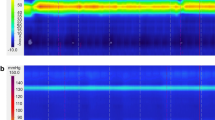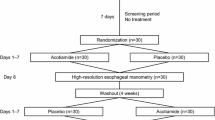Abstract
The effects of graded exercise on esophageal motility and gastroesophageal reflux were evaluated in nine nontrained subjects, using a catheter with three strain-gauge transducers connected to a solid-state datalogger and an ambulatory intraesophageal pH monitor. Subjects exercised on a stationary bike at 45%, 60%, 75%, and 90% of peak O2 uptake (\(\dot V\)O2 max). Durations of exercise sessions and rest periods varied among subjects. Studies were performed after an overnight fast and subjects received only intravenous infusion of 5% glucose solution during the study. Plasma concentrations of gastrin, motilin, glucagon, pancreatic polypeptide (PP), and vasoactive intestinal peptide (VIP) were determined at rest and before and after each exercise session. The duration, amplitude, and frequency of esophageal contractions declined with increasing exercise intensity, and the differences were significant (P≤0.05) for all three variables at 90%\(\dot V\)O2 max. The number of gastroesophageal reflux episodes and the duration of esophageal acid exposure were significantly (P≤0.05) increased during exercise at 90%\(\dot V\)O2 max. Plasma regulatory peptide concentrations showed no significant changes between rest and the various exercise sessions. Thus, exercise has profound effects on esophageal contractions and gastroesophageal reflux, which are intensity dependent. These effects were not mediated by the hormones measured. The results were similar to those observed in highly trained athletes, suggesting that the effects of exercise on esophageal function are similar in trained and nontrained subjects performing at similar percentages of\(\dot V\)O2 max, even though the absolute levels of exercise achieved in each group are different.
Similar content being viewed by others
References
Moses FM: The effect of exercise on the gastrointestinal tract. Sports Med 9:159–172, 1990
Clark CS, Kraus BB, Sinclair J, Castell DO: Gastroesophageal reflux induced by exercise in healthy volunteers. JAMA 261:3599–3601, 1989
Soffer EE, Merchant RK, Duethman G, Launspach J, Gisolfi C, Adrian TE: Effect of graded exercise on esophageal motility and gastroesophageal reflux in trained athletes. Dig Dis Sci 38:220–224, 1993
Soffer EE, Summers RW, Gisolfi C: The effect of exercise on intestinal motility and transit in trained athletes. Am J Physiol 260:G698-G702, 1991
Hilsted H, Galbo B, Sonne T, Schwartz J, Fahrenkrug J, Schaffalitzky de Muckadell OB, Lauritsen KB, Trovier B: Gastroenteropancreatic hormonal changes during exercise. Am J Physiol 239:G136-G140, 1980
Sullivan SN, Champion MC, Christofides ND, Adrian TE, Bloom SR: GI regulatory peptide responses in long-distance runners. Physician Sport Med 12:77–82, 1984
Carter JE, Gisolfi CV: Fluid replacement during and after exercise in the heat. Med Sci Sports Exerc 21:532–539, 1989
Bloom SR, Long RG: Radioimmunoassay of Gut Regulatory Peptides. London, Saunders, 1982
Masclee AAM, De Best ACAM, De Graaf R, Cluysenaer OJJ, Jansen JBMJ: Ambulatory 24-hour pH-metry in the diagnosis of gastroesophageal reflux disease. Scand J Gastroenterol 25:225–230, 1990
Kramer MS: Clinical Epidemiology and Biostatistics. Berlin, Springer-Verlag, 1988, pp 174–175
Kraus BB, Sinclair JW, Castell DO: Gastroesophageal reflux in runners, characteristics and treatment. Ann Intern Med 112:429–433, 1990
Clausen JP: Effect of physical training on cardiovascular adjustment to exercise in man. Physiol Rev 57:779–815, 1977
Gingerich RL, Hickson RC, Hagberg JM, Winder WW: Effect of endurance exercise training on plasma pancreatic polypeptide concentration during exercise. Metabolism 28:1179–1182, 1979
Qamar M, Reed A: Effects of exercise on mesenteric blood flow in man. Gut 28:583–587, 1987
Rowell LB, Blackman JR, Bruce RA: Indocyanine-green clearance and estimated hepatic blood flow during mild exercise in upright man. J Clin Invest 43:1677–1690, 1977
Saltin B, Blomquist G, Mitchell JH, Johnson RL Jr, Wildenthal K, Chapman CB: Response to exercise after bed rest and after training. Circulation 38(suppl 7):1–78, 1968
Krotkiewski M, Bjorntorp P, Holm G, Marks V, Morgan L, Feurle GE: Effects of physical training on insulin, C peptide, GIP or PP levels in obese subjects. Int J Obes 8:193–198, 1984
Bingham SA, Cummings JH: Effect of exercise and physical fitness on large intestinal function. Gastroenterology 97:1389–1399, 1989
Winder WW, Hickson RC, Hagberg JM, et al: Training induced changes in hormonal and metabolic responses to submaximal exercise. J Appl Physiol 46:766–771, 1979
Marco J, Hedo JA, Villanueva ML: Control of pancreatic polypeptide secretion by glucose in man. J Clin Endocrinol Metab 46:140–145, 1978
Christofides ND, Bloom SR, Besterman HS, Adrian TE, Ghatei MA: Release of motilin by oral and intravenous nutrients in man. Gut 20:102–106, 1979
Taylor IL, Mannon P: Gastrointestinal hormones.In Textbook of Gastroenterology, Vol 1. T Yamada, et al (eds). Philadelphia, JB Lippincott, 1991, pp 24–49
Author information
Authors and Affiliations
Additional information
A preliminary report of this work was given at the annual meeting of the American Gastroenterological Association, May 1992, and was published as an abstract in Gastroenterology (102:517, 1992).
This study was supported by grant RR59 for General Clinical Research Center Program, Division of Research Resources, NIH.
Rights and permissions
About this article
Cite this article
Soffer, E.E., Wilson, J., Duethman, G. et al. Effect of graded exercise on esophageal motility and gastroesophageal reflux in nontrained subjects. Digest Dis Sci 39, 193–198 (1994). https://doi.org/10.1007/BF02090082
Received:
Revised:
Accepted:
Issue Date:
DOI: https://doi.org/10.1007/BF02090082




